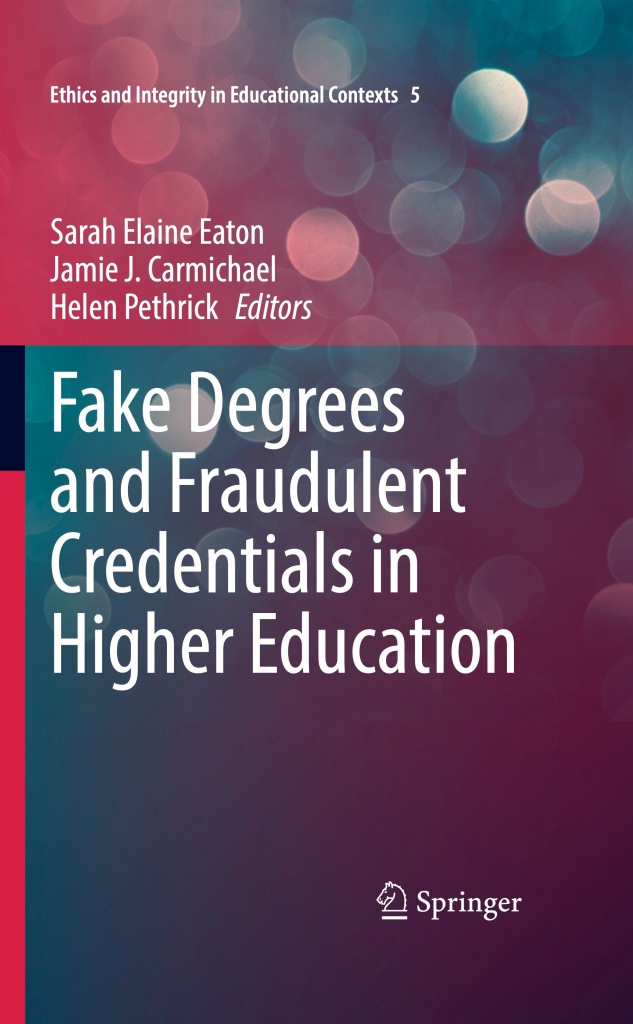We are pleased to share the news that our edited book, Fake Degrees and Fraudulent Credentials in Higher Education, has been submitted for publication (Eaton, Carmichael, and Pethrick, eds.) to Springer Nature. The book is slated for publication in early 2023.
Book description
This book addresses an important topic in higher education: credential fraud. This includes, but is not limited to, fake degrees, diploma mills, admissions fraud, and cheating on standardized admissions tests. The book directly addresses fake and fraudulent credentials in higher education. It explores transcript tampering and fraud in varsity athletics and discusses lazy practices in the higher education hiring processes that open the door for professors without proper credentials to get jobs in post-secondary institutions.
The book also discusses how technology is being used to stop the proliferation of fake and fraudulent credentials in a variety of ways, including blockchain technology.
Table of Contents
Here is a sneak preview of the table of contents:
Chapter 1: Fake Degrees and Credential Fraud, Contract Cheating, and Paper Mills: Overview and Historical Perspectives – Sarah Elaine Eaton & Jamie Carmichael
Chapter 2: Admissions Fraud in Canadian Higher Education – Jamie Carmichael & Sarah Elaine Eaton
Chapter 3: Yesterday, Today, and Tomorrow: A Tour of Axact, the “World’s Largest Diploma Mill” – Allen Ezell
Chapter 4: Bridging Today to Tomorrow: A Historical and Technological Review of Credential Exchange in Higher Education within Canada – Joanne Duklas
Chapter 5: Fair play, Fraud, or Fixed? Athletic Credentials in US Higher Education – Kirsten Hextrum
Chapter 6: Corruption in Admissions, Recruitment, Qualifications and Credentials: from Research into Quality Assurance – Stella-Maris Orim & Irene Glendinning
Chapter 7: Avoiding Favouritism in the Recruitment Practice of Turkish Higher Education Institutions Özgür Çelik & Salim Razı
Chapter 8: None of the Above: Integrity Concerns of Standardized English Proficiency Tests – Soroush Sabbaghan & Ismaeil Fazel
Chapter 9: Examining the Problem of Fraudulent English Test Scores: What Can Canadian Higher Education Institutions Learn? – Angela Clark
Chapter 10: There is no culture? A Framework for Addressing Admissions Fraud – Brendan DeCoster
Chapter 11: Security Risks, Fake Degrees, and Other Fraud: A Topic Modelling Approach – Jamie Carmichael & Sarah Elaine Eaton
Chapter 12: Are You for Real? Lessons for the Academy About Professors with Fake or Fraudulent Degrees – Sarah Elaine Eaton & Jamie Carmichael
Chapter 13: Fake Degrees and Fake Degrees and Fraudulent Credentials in Higher Education: Conclusions and Future Directions – Jamie Carmichael & Sarah Elaine Eaton
About the editors
Sarah Elaine Eaton
Werklund School of Education, University of Calgary, Calgary, Alberta, Canada.
Sarah Elaine Eaton, PhD, is an Associate Professor of Education at the University of Calgary, Canada, where she also serves as the inaugural Educational Leader in Residence, Academic Integrity. Eaton’s research focuses on academic ethics in higher education. Her work can be found in the British Educational Research Journal, the Journal of Academic Ethics, the Journal of Educational Thought and Interchange, among other places. She is the Editor-in-Chief of the International Journal for Educational Integrity (Springer Nature) and co-founder and co-editor of Canadian Perspectives on Academic Integrity. In 2020 she received the national Research and Scholarship award from the Canadian Society for the Study of Higher Education (CSSHE) for her contributions to research on academic integrity in Canadian higher education.
Jamie J. Carmichael
Carleton University, Ottawa, Ontario, Canada.
Jamie Carmichael is the Associate Registrar of Scheduling and Systems at Carleton University. She is responsible for the construction of the university timetable, scheduling and administration of examinations, the operation of two examination centres for students with disabilities, a university-wide space management system, and other core student administrative systems. Since 2009, she has received ten service excellence nominations for her work that ranges from information technology projects, team acknowledgment to innovation.
Carmichael’s research lies at the intersection of academic integrity and machine learning, with graduate education in Applied Science in Technology Information Management (Engineering). She has presented or co-presented at national and international conferences and is often called up on by specialized groups in higher education to present on her work.
Helen Pethrick
University of Calgary, Calgary, Alberta, Canada.
Helen Pethrick, MA, is a researcher and educator in Calgary, Alberta, Canada. Research areas include academic integrity in higher education, post-secondary student mental health and well-being, and peer mentorship in educational settings.
Related posts:
Fake Degrees and Fraudulent Credentials: Research Project Update
Scholarships Without Scruples: 3 Signs of Bogus Scholarships and Scams
_________________________________
Share or Tweet this: Forthcoming book: Fake Degrees and Fraudulent Credentials in Higher Education – https://drsaraheaton.wordpress.com/2022/10/16/forthcoming-book-fake-degrees-and-fraudulent-credentials-in-higher-education/
This blog has had over 3 million views thanks to readers like you. If you enjoyed this post, please “like” it or share it on social media. Thanks!
Sarah Elaine Eaton, PhD, is a faculty member in the Werklund School of Education, and the Educational Leader in Residence, Academic Integrity, University of Calgary, Canada. Opinions are my own and do not represent those of the University of Calgary.




 Posted by Sarah Elaine Eaton, Ph.D.
Posted by Sarah Elaine Eaton, Ph.D. 



You must be logged in to post a comment.